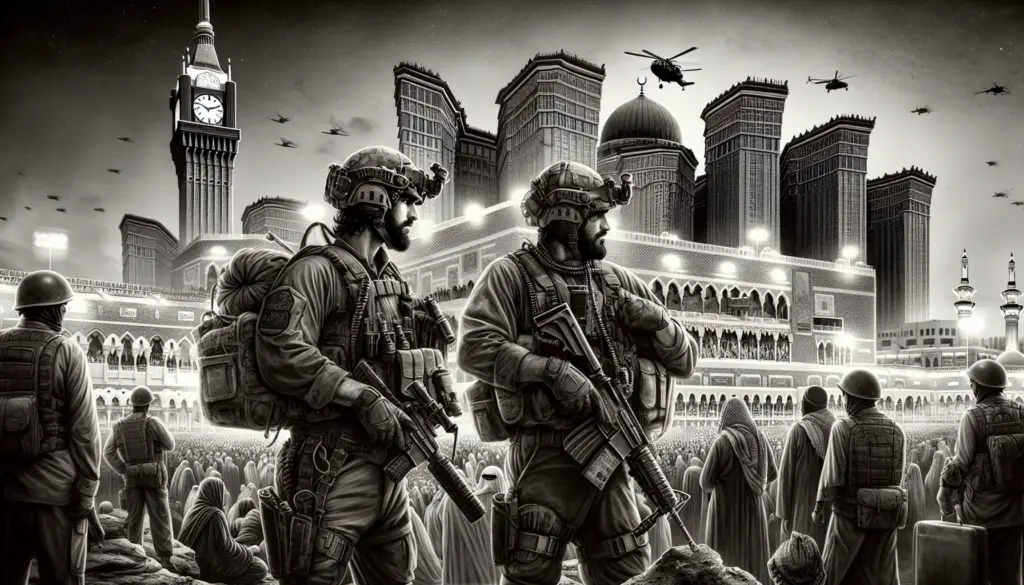The Siege of the Grand Mosque: Pakistan’s Role in Ending the Crisis
Grand Mosque Crisis: The Seizure of the Kaaba
On November 20, 1979, the unthinkable happened. The Grand Mosque Crisis in Mecca, the holiest site in Islam, was seized by a group of armed extremists. This shocking event, known as the Siege of the Kaaba, sent shockwaves throughout the Muslim world. It tested the resolve of the Saudi government to respond to this unprecedented Grand Mosque Crisis. Pakistan’s involvement in the Grand Mosque Crisis became crucial as regional stability hung in the balance. Pakistan’s strategic decisions and diplomatic efforts during the Grand Mosque Crisis played a pivotal role in shaping the outcome.
Grand Mosque Crisis: The Extremist Takeover
The group responsible for seizure was led by Juhayman al-Otaibi former member of the Saudi National Guard. He had become disillusioned with the Saudi monarchy. Otaibi and his followers numbered around 400-500 men, women and children. They stormed the Grand Mosque. They took thousands of worshippers hostage. They barricaded themselves inside.
The extremists had list of demands including the overthrow of the Saudi royal family. They wanted the establishment of Islamic state. They also called for the release of imprisoned comrades and stricter interpretation of Islamic law. The Saudi government was caught off guard. Audacity of the attack stunned them. They struggled to formulate an effective response.
Pakistan’s Involvement
As the crisis unfolded Saudi government realized they needed assistance from outside sources. They sought help to regain control of the Grand Mosque. They turned to their neighbor. Pakistan for help.

Related Article : Arab-Israeli War: Pivotal Moment in Middle Eastern History
The SSG Commandos
Pakistan’s Special Service Group (SSG) elite special operations unit, was dispatched to Saudi Arabia to aid in rescue effort. The SSG commandos known for their expertise in urban combat and hostage rescue operations. They were instrumental in the eventual resolution of the siege.
Under leadership of General Zia-ul-Haq, the President of Pakistan at the time. The SSG commandos worked closely with Saudi security forces to devise plan to retake the Grand Mosque. Their specialized training and combat experience proved invaluable in complex and delicate operation.
The Assault on the Mosque
Assault on Grand Mosque began on November 25 1979 after negotiations with extremists had broken down. SSG commandos, supported by Saudi security forces launched coordinated attack to regain control of holy site.
Battle was fierce and chaotic. The extremists put up a determined resistance. The SSG commandos displayed exceptional skills. They systematically cleared mosque of armed intruders. After a grueling 17-day siege Grand Mosque was finally liberated. The hostages were freed.
The Aftermath
The Siege of Kaaba was watershed moment in history of Saudi Arabia and Muslim world. The successful resolution of the crisis. With critical assistance of Pakistani SSG commandos solidified the Saudi monarchy’s grip on power. It also demonstrated their ability to defend the holy sites of Islam.
The event also highlighted strong ties between Pakistan and Saudi Arabia. Two of the most influential Islamic nations in world. The cooperation and support provided by Pakistan during crisis cemented the two countries’ strategic alliance. This continues to this day.
The Lasting Impact
The Siege of Kaaba had profound impact on Muslim world. Serving as stark reminder of threats faced by Islamic faith. It also underscored importance of international cooperation. And the willingness of Muslim nations to come to aid of one another in times of crisis.
The role played by Pakistan’s SSG commandos in ending siege was a testament to country’s commitment to defense of Islam. And its holy sites. The bravery and skill displayed by Pakistani forces during operation have become stuff of legend. Their contribution to resolution of crisis is widely recognized and celebrated in Muslim world
Conclusion
The Siege of Kaaba was pivotal moment in history of Muslim world and crucial role played by Pakistan in ending the crisis is testament to the strong ties between the two countries. The enduring commitment of Pakistani people to defense of Islam was evident. The lessons learned from this event continue to shape the geopolitical landscape of the region. It also influences the broader Islamic world.

